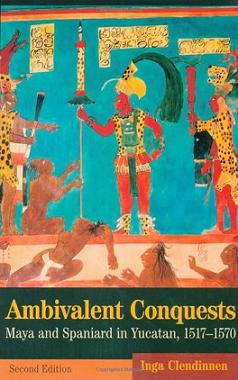Inga Clendinnen
Ambivalent Conquests

An interesting look at the encounter of Spaniards and Mayas through conquest and colonization. An eye-opening essay that -as it should- brings into the consideration of the reader all the possible interpretations that the facts allow. I think the title is very appropriate because not everything is just black or white; there aren't just angels and devils in the story of the conquest and colonization of South America. The amazing thing is that all the protagonists have their dark and their bright side to tell. The book is divides unevenly on two parts: the first parts zooms in on the Spaniards, their motivation and arguments for what they did; the second, shorter, centers on what little -if anything- we know first-hand from the natives. The book cleverly picks up on the life of Franciscan friar Diego de Landa. His story serves as the thread that connects all others.
The book is not the typical show-off product from the liberal Ivy League college professors. Plus it's very readable, free from academic jargon.
The minuses are its second -but shorter- part, having no written testimonies from the natives, and the lack of any map of illustration of worth. We are told that the book focuses on the encounters that took place on the Yucatan peninsula, but there's a lot of traveling and action taking place here and there, and no help is given to the reader to geographically situate himself.
If only for the first part, the book is a very interesting read and brings a new light on how both peoples must have felt in their daily encounters with their new neighbors.
